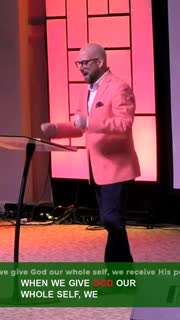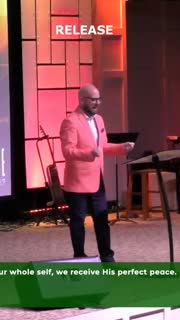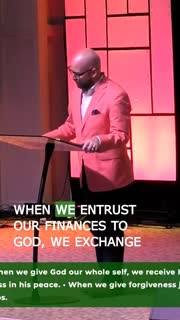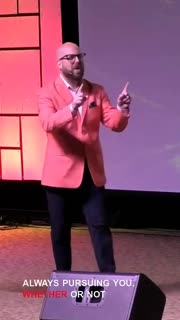Trusting God: Finances and Spiritual Peace
Devotional
Sermon Summary
Bible Study Guide
Sermon Clips
1. "What those type of moments mean is that you have a choice. Like, we can operate in the freedom and the Lord can do something significant. Or we can hold back and not give everything to the Lord who we are. Again, that looks different for everybody. What that looks like for you is going to look different for me. That's part of being individuals in the body of Christ." [28:46] (16 seconds)
2. "When we give God our whole self, we receive his perfect peace. We give God everything that we are. We give it to him so that we can find real peace in our lives. The second week, we begin to talk about what it means to have peace with ourself. Because you know yourself. You know all the things you've ever done. And there are days that regret, shame, guilt can overflow in you." [43:44] (26 seconds)
3. "When we release our guilt to God, we find wholeness in his peace. Our desire, God desires for us to be whole. He does not want you to live a fractured life. He desires for you to be whole. But you can only find true wholeness in him." [44:38] (17 seconds)
4. "When we give forgiveness just as we have received, we open the door to peace within our relationships. That's easier said than done. But because of the forgiveness Jesus has given us, we have to give forgiveness to other people. Doesn't mean they're going to receive it, doesn't mean that there's full reconciliation, but it means that we can find peace." [45:28] (19 seconds)
5. "When we entrust our finances to God, we exchange our worry for His peace. Now, we've been on this journey of finding how to find real peace in our lives. And today, we are tackling finances. It's no secret that money-related stress is one of the leading causes of anxiety. For most people, it's usually at the very top of the list." [47:24] (24 seconds)
6. "When we talk about having peace in our lives, stress plays a vital role in that because stress stops peace. Well, what is one of the number one ways of stress? Well, 64% of adults, identify this as a source of stress. It's the number one. I haven't told you what it is yet. You haven't missed anything. That's on purpose." [46:41] (18 seconds)
7. "Giving is simply a matter of trusting God. What it is, it's simply trusting God. It shows your level of trust in Him. And that's a huge part. Because here's what happens, and we've talked about this for this entire series, is that there are parts of our heart, because they're difficult to deal with, we go before the Lord and we say, Lord, we don't say it out loud, but we really are doing this, Lord, You can have 85% of my heart." [52:57] (28 seconds)
8. "God is always pursuing you. Whether or not you're pursuing Him does not matter. He is pursuing you. He is waiting on you to make the decision to turn all of your life over to Him. And even if you say, well, I follow the Lord. But if you are not giving the Lord all of your life, He is still pursuing you saying, Jack, give me everything you've got. I want 100%. I don't want 92.4%. I want 100% of who you are." [54:14] (29 seconds)
9. "When we disagree with God, we need to change. Because we have to understand often our disagreements with God stem from a misalignment of our priorities or a misunderstanding of His character. Truthfully, when it comes to giving, we might question God's wisdom or even His goodness. We might wonder why He asks us to give when we don't even feel like we have enough." [56:08] (22 seconds)
10. "God blesses faithfulness. He does. It's all in Scripture. He blesses faithfulness. Now, here's the thing. When we talk about stewardship, many of us would not question the mindset of stewardship, because it's in all of our lives. I mean, let's look at this. If you don't steward your health, you're going to suffer physically." [01:04:38] (24 seconds)
Ask a question about this sermon
2. "When we give God our whole self, we receive his perfect peace. We give God everything that we are. We give it to him so that we can find real peace in our lives. The second week, we begin to talk about what it means to have peace with ourself. Because you know yourself. You know all the things you've ever done. And there are days that regret, shame, guilt can overflow in you." [43:44] (26 seconds)
3. "When we release our guilt to God, we find wholeness in his peace. Our desire, God desires for us to be whole. He does not want you to live a fractured life. He desires for you to be whole. But you can only find true wholeness in him." [44:38] (17 seconds)
4. "When we give forgiveness just as we have received, we open the door to peace within our relationships. That's easier said than done. But because of the forgiveness Jesus has given us, we have to give forgiveness to other people. Doesn't mean they're going to receive it, doesn't mean that there's full reconciliation, but it means that we can find peace." [45:28] (19 seconds)
5. "When we entrust our finances to God, we exchange our worry for His peace. Now, we've been on this journey of finding how to find real peace in our lives. And today, we are tackling finances. It's no secret that money-related stress is one of the leading causes of anxiety. For most people, it's usually at the very top of the list." [47:24] (24 seconds)
6. "When we talk about having peace in our lives, stress plays a vital role in that because stress stops peace. Well, what is one of the number one ways of stress? Well, 64% of adults, identify this as a source of stress. It's the number one. I haven't told you what it is yet. You haven't missed anything. That's on purpose." [46:41] (18 seconds)
7. "Giving is simply a matter of trusting God. What it is, it's simply trusting God. It shows your level of trust in Him. And that's a huge part. Because here's what happens, and we've talked about this for this entire series, is that there are parts of our heart, because they're difficult to deal with, we go before the Lord and we say, Lord, we don't say it out loud, but we really are doing this, Lord, You can have 85% of my heart." [52:57] (28 seconds)
8. "God is always pursuing you. Whether or not you're pursuing Him does not matter. He is pursuing you. He is waiting on you to make the decision to turn all of your life over to Him. And even if you say, well, I follow the Lord. But if you are not giving the Lord all of your life, He is still pursuing you saying, Jack, give me everything you've got. I want 100%. I don't want 92.4%. I want 100% of who you are." [54:14] (29 seconds)
9. "When we disagree with God, we need to change. Because we have to understand often our disagreements with God stem from a misalignment of our priorities or a misunderstanding of His character. Truthfully, when it comes to giving, we might question God's wisdom or even His goodness. We might wonder why He asks us to give when we don't even feel like we have enough." [56:08] (22 seconds)
10. "God blesses faithfulness. He does. It's all in Scripture. He blesses faithfulness. Now, here's the thing. When we talk about stewardship, many of us would not question the mindset of stewardship, because it's in all of our lives. I mean, let's look at this. If you don't steward your health, you're going to suffer physically." [01:04:38] (24 seconds)










